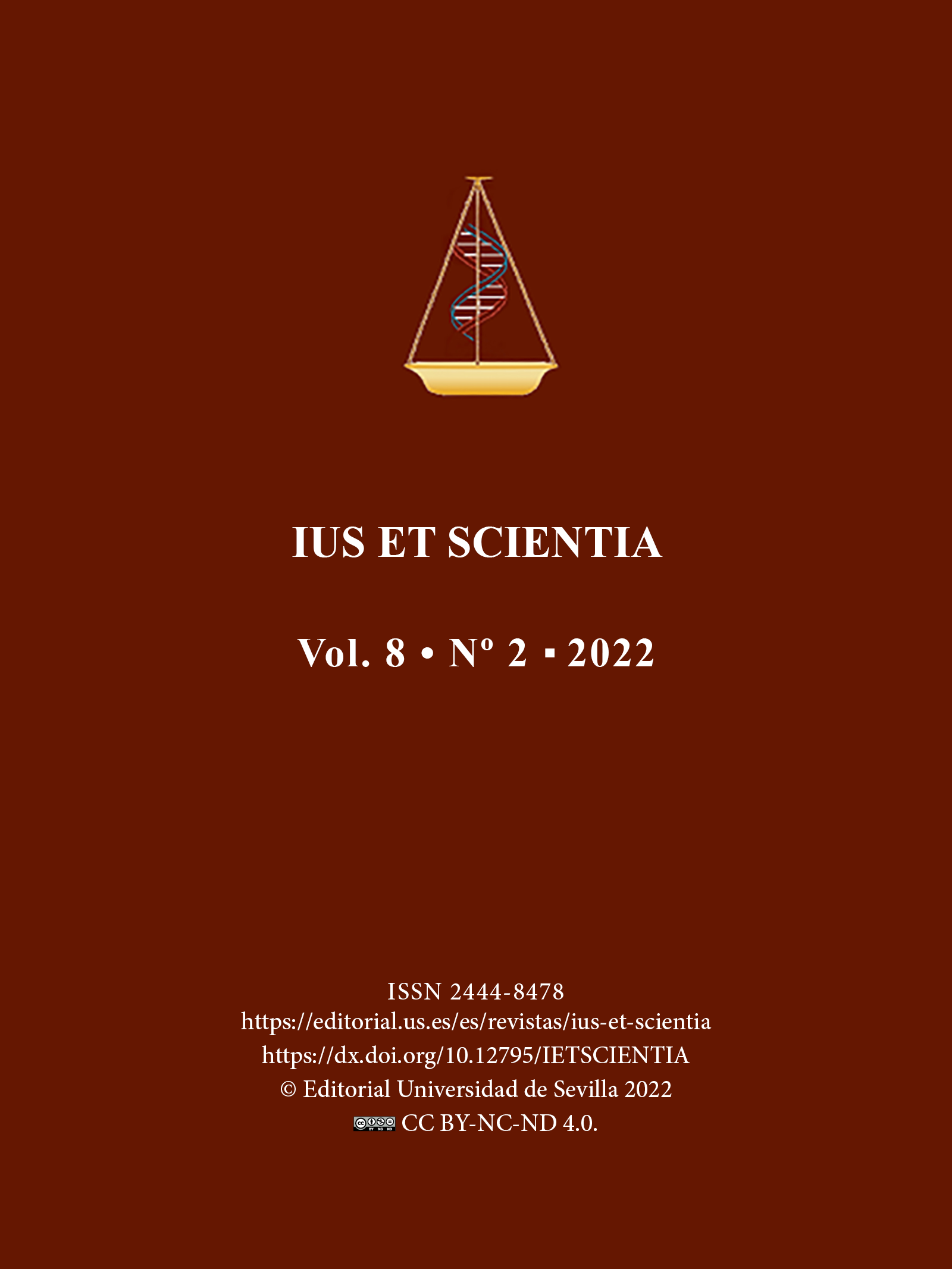Artificial intelligence: When algorithms become neurons
DOI:
https://doi.org/10.12795/IESTSCIENTIA.2022.i02.10Keywords:
Artificial Intelligence, Medicine, eHealth, Liability, Soft LawAbstract
In recent years, the use of Artificial Intelligence (IA) has led to very significant changes in different areas of human life. Medicine is one of those sectors where these changes have had the greatest impact. The purpose of this paper is the analysis of tools based on eHealth and neurorobotics that can reduce the human workload and contribute to a better management of public health, considering certain ethical-legal problems that must be taken into consideration. In this sense, a study is carried out on the issue of liability in case of damages caused by the use of IA systems through certain soft law tools, carried out by the European legislator. In this regard, the new Proposal for Directive COM (2022) 496 final of the European Parliament and of the Council on the adaptation of non-contractual civil liability rules to IA (AI-Liability Directive) is analyzed, considering that it can lead to very significant innovations.
Downloads
References
“Cos’è la eHealth (Salute Digitale), Blog Salute Digitale / eHealth Blog. Consultado en fecha 10 de octubre de 2022 en: https://www.blogsalutedigitale.it/ehealth/
“eHealth Per le Persone Senza Arti: Open Bionics”, Blog Salute Digitale / eHealth Blog. Consultado en fecha 10 de octubre de 2022 en: https://www.blogsalutedigitale.it/2018/03/21/ehealth-persone-senza-arti-open-bionics/
CAMPAGNA, Leo. (13 giugno 2022). “Rivoluzione Metaverso, la nuova frontera dei gemelli digitali”, Economia&Finanza. Consultado en fecha 10 de octubre de 2022 en https://financialounge.repubblica.it/news/2022/06/13/rivoluzione-mataverso-la-nuova-frontiera-dei-gemelli-digitali?y=62.
FLORIDI, Luciano, (2022). Etica dell’Intelligenza Artificiale. Sviluppi, opportunità, sfide, Milano, Raffaello Cortina Editore, pp. 123-126.
HANS, Oh; RIZO, Carlos; ENKIN, Murray; JADAD Alejandro. “What is eHealth: A Systematic Review of Published Definitions”, Journal of Medical Internet Research, 2005, vol. 7, enero – marzo. Consultado en la fecha 07 de octubre de 2022: https://www.ncbi.nlm.nih.gov/pmc/articles/PMC1550636/#ref42
HESTON, Thomas F. (2018). eHealth – Making Health Care Smarter, Londres, Intech Open, pp. 65-74.
JUVAL NOHA, Harari (2017), Homo deus: breve historia del mañana. trad. J. ROS, Barcelona, Debate.
KOUROU, Konstantina, EXARCHOS, Themis P., EXARCHOS, Konstantinos P., M. V. KARAMOUZIS, Michalis V., FOTIADIS, Dimitrios I., “Machine learning applications in cancer prognosis and prediction”, Computational Andstructural Biotechnology Journal, 2015, vol. 13, pp. 8–17.
L. G. DE RIVERA. (5 giugno 2022). Inteligencia Artificial. La revolución que està cambiando nuestra vida. Muy Interesante, num. 493.
LAGHI, Andrea (Coord.). (9 novembre 2021). “I sistemi di Intelligenza Artificiale come strumento di supporto alla diagnostica”, Sezione V del Ministero della Salute del Consiglio Superiore della Sanità italiana.
LLANO ALONSO, Fernando Higinio (Dir.), (2022), “Singularidad Tecnológica, Metaverso e Identitdad personal: Del Homo Faber al Novo Homo Ludens”, Inteligencia Artificial y Filosofia del Derecho, Murcia, Ediciones Laborum S. L.
MATHENY, Michael; DANIELLE, Whicher; ISRANI, Sonoo Thadaney; “Artificial Intelligence in Health Care - A Report From the National Academy of Medicine”, Jama, 17 diciembre 2019.
MESKÓ, Bertalan, DROBNI, Zsófia, BÉNYEI, Éva, GERGELY, Bence, GYŐRFFY, Zsuzsanna, “Digital health is a cultural transformation of traditional healthcare”, Mhealth, 2017, vol. 3.
PALMERINI, Erica, “Robotica e diritto: suggestioni, intersezioni, sviluppi a margine di una ricerca europea”, Responsabilità civile e previdenza, 2016, vol. 6, p. 1816.
TORRISI, Carla, “Diagnosi precoci con l’Intelligenza Artificiale”, Il giornale della previdenza dei medici e degli odontoiatri, 2022, n° 1-2-3.
(01 de Octubre de 2022), “Musk presenta il suo robot umanoide Optimus. Innaffia e fa compiti semplici. “Gli manca un cervello”, la Repubblica. Consultado en fecha 25 de septiembre de 2022 en: https://www.repubblica.it/economia/2022/10/01/news/musk_robot_optimus_tesla-368109789/.
Published
How to Cite
Issue
Section
License
Copyright (c) 2022 Alessandra Esther Castagnedi Ramirez

This work is licensed under a Creative Commons Attribution-NonCommercial-ShareAlike 4.0 International License.
Those authors being published in this journal agree to the following terms:
- Authors retain their copyright and they will guarantee to the journal the right of first publication of their work, which will be simultaneously subject to license recognition by Creative Commons that allows others to share such work provided it is stated the author’s name and his first publishing in IUS ET SCIENTIA.
- Authors may take other non-exclusive distribution license agreements version of the published work (e.g. deposit in an institutional digital file or publish it in a monographic volume) provided it is stated the initial publication in this journal.
- It is allowed and encouraged that Author s disseminate their work via the Internet (e. g. institutional digital files or on their website) prior to and during the submission process, which can lead to interesting exchanges and to increase citation of the published work.
- Abstract 417
- PDF (Español (España)) 327
- HTML (Español (España)) 110





